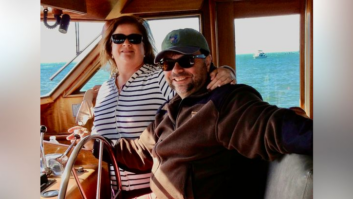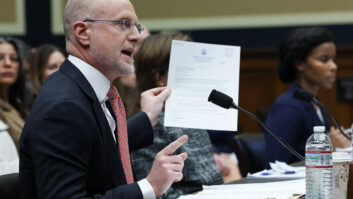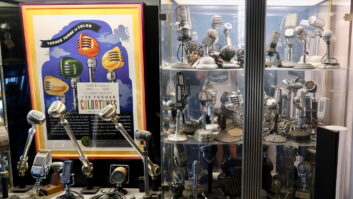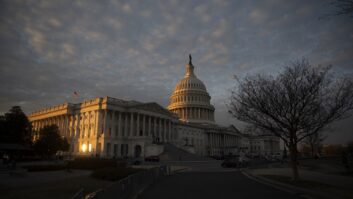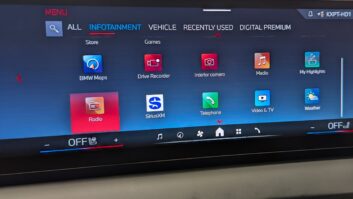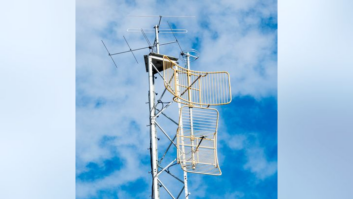Eiji Yoshikawa, based in Tokyo, is publisher of Radio World’s sister publications TV Technology Japan and Audio Media Japan. He is also a peace advocate and a boxer who got back in the ring at age 50 “to prove to children that following dreams is the most important.” He wrote the following on March 12 about his experience of the natural disaster in Japan.
From Wednesday this week, my family booked a “weekend+ stay” in a hotel in Shinagawa, in midtown Tokyo. I went to schools to give lectures on peacemaking, met with my friends and did other activities in Tokyo.
It was far more than horrible. Earthquakes every five minutes. Tsunami warnings following every shake. Last night, there were earthquake all the time and you could hear squeaking noises from everywhere.
The best news is that people are kinder. What I recalled was the same feeling I got when I went to New York right after 9/11. People are very quiet, silent, walking towards somewhere they need to go. On trains, busses and in the streets, they are very quiet. Kind of like thousands of mice, walking towards something.
The worst news is that nuclear power plants have just had a couple of explosions and they are sensing radiation. Government guys and the people in charge had a press meeting one minute ago, but didn’t say anything clear — which is bad news.
When the officials say, “only this much radiation,” the truth is enormously clear. They first said, “People who live within two miles, please evacuate.” A few minutes later, they said, “Six miles.” Then again, “Twelve miles.” Anyone can tell that’s ridiculous.
Back to my own story…
I was meeting a friend of mine over a cup of café au lait in Setagaya, Tokyo. He started reading a few pages of the magazine that I publish. “Excuse me. I have to hit the bathroom,” I said.
As I was washing my hands in the sink in the bathroom, I felt a kind of vertigo. When I looked up, the mirror and lamps were shaking. The windows were also making noise. I quickly unlocked the toilet door and walked with difficulty back to the table. I heard noise from everywhere as the glasses and bottles from the shelves smashed on the floor of the fancy coffee shop. My friend, Jiro, was standing and looking at the ceiling.
I grabbed my camera, and looked outside and down the street, from the third floor. People, like mothers and kids and friends, were holding each other, not knowing what to do. Electric poles were dancing and getting ready to fall and smash on the streets. It was a long tremor. It lasted about two minutes or more.
People in the streets and at the tables were frozen for a while after the big shake-up, and then they all started calling and e-mailing through their phones. I called a couple of places, but there was no connection at all.
My wife, Gucci, and our two boys were somewhere in the town of Shinagawa, which was eight miles away. I walked for 45 minutes through a strange part of town and then found a bus that was 90 percent full and completely silent. There were no words from anyone’s mouth.
I arrived at Meguro Station and then walked one hour to get to Shinagawa.
I met thousands and thousands of people who were just walking and walking and walking, trying to find somewhere they could get a train or a bus or a taxi, but nothing was available for at least an hour after the earthquake. What seemed most difficult were those typical Japanese ladies, both young and old, who wear funny-looking boots or high heels. They were carrying two or three paper bags of provisions on top of their Louis Vuitton bags, and walking up and down the hard asphalt street.
In that hour, there were at least two more big shakes and there must have been more.
Finally, I arrived at the Shinagawa Prince Hotel. The lobby was filled with confused people, especially those who didn’t understand the Japanese language. As I walked by them, I gave them a quick translation of the announcement. I didn’t see my kids and their mother.
I checked with the concierge girl. She used PHS or some type of their own phone system to talk to someone. She said that they cleared everyone from the twenty-fourth floor where our room was. They guided everyone to the evacuation spots in and out of the lobby.
I asked the lady to check with her colleague again, asking, “Was my family — a mother with two little boys — in the room? Or was there no one in the room?”
She called again and found out that they didn’t see any family like that.
“Ok,” I said. “They are in the town of Shinagawa somewhere.”
I left a message with the concierge that I was searching for my family. They were very kind, and said that they’d check all the evacuation spots near the hotel. I started looking in the shops that I had shown and recommended to my family the day before. I didn’t see them.
I bought lots of Volvic water bottles and a number of lunch boxes in one of the shops. The moment that I brought the shopping basket with the emergency food to the checkout, the shop people started shouting, “We’re closing the shop. More earthquakes are coming!” I paid for everything, pushed all that food into my backpack, and started searching again.
I went to the massive Shinagawa Station where millions of people coming from all directions were all jammed up. I went through the crowd in a zigzag fashion, being pushed back; being pushed aside… On the other side of the station, there were some coffee shops and toy shops that my family could have been in. I checked all of them, but no luck. The shops were all occupied by business people who were already expecting that they might have to spend eight more hours there, or even all night long.
I kept walking and walking and walking, and finally went back to the concierge at the hotel. Although it was winter in Tokyo, I was sweating like a long-distance runner.
The same lady I had spoken to before saw me from across the counter, and said, “We found your family.” She was dressed like an airline attendant, with high heel shoes, but kindly walked all the way with me to the furthest evacuation spot. I said more than a couple of times to her, during the seven-minute walk, “I can go there by myself. You are busy.” She said, “I’d like to make sure you meet your family.”
Finally, we arrived at a place that looked like a circus tent. It was a water pool for a dolphin show, and was part of the aquarium.
My family had been there the day before, without me, and they had told me about it. That’s why I searched everywhere except that place, as I didn’t think that they’d go back to the same show. As the concierge lady and I walked into the rather dark tent, I saw my family; Gucci and Ken and our one-year-old, Jun. I raised my hand, and everyone saw me.
“Ken!” I said. Four-year-old Ken ran to me.
“Ken, tough guy! Ken, the champ! Thank you for protecting everyone!”
Ken said, “Yes,” and then his eyes welled up and he didn’t say anything more.
“We were lucky,” my wife said. “We were walking by the tent and saw everything shaking, including those two big construction cranes and the two tall buildings. Then the dolphin guys told us to come inside for safety. And they are very nice! They are doing a free dolphin show for everyone.”
When I arrived at their seats, Gucci said, “Here’s my husband. This is the guy!” Everyone around us was very nice and asked me about how the “outside world” was. By the dolphin pool, I saw a number of mothers with little children, and gave them the food I bought. The hotel and show staff were extremely nice and kind. They were all in their 20s and early 30s, which made me feel really happy because that age group will be the ones to carry on in the near future.
They set up one TV screen in the tent and people watched the news about the tsunami in the northern coast and the “new” earthquakes that appeared in a different area or spot each time, which was like a bombing, or having landmines everywhere.
Got some blankets.
The dolphin show reminded me that Japanese are murdering dolphins and people here don’t seem to care, even while they enjoyed the cuteness and the charm of the dolphins at the show. The worst fact is that few Japanese are complaining about it. Right-wing gangsters fight back hard when people overseas try to stop the killing. Each time we eat fish, I tell my son Ken, “We are killing too many of these fish, including billions of babies. We should not kill and sell lives and many people don’t even finish them, and then throw them away. We must say sorry, and thank you to them. One day, the sea will get angry at us.”
While holding the plate in front of him, Ken then says, “Sorry, fish.”
All night long, there were many, many earthquakes, both big and small. We thought about the many people who experienced the very scary earthquake, and then were hit by the even scarier tsunami and died.
So… we came home, and we read a number of warm-hearted and caring e-mails from all over the world.
Even when I visit the bathroom, Ken says, “We should never be apart again.”
Thank you for your love. Let there be no nuclear power plants in the world, because then there’s no world.
This was originally published in the Significato Journal, http://significatojournal.com. Eiji Yoshikawa, shown at left below, is nicknamed the “Compassionate Pugilist.” His website is www.eiji.tv.

